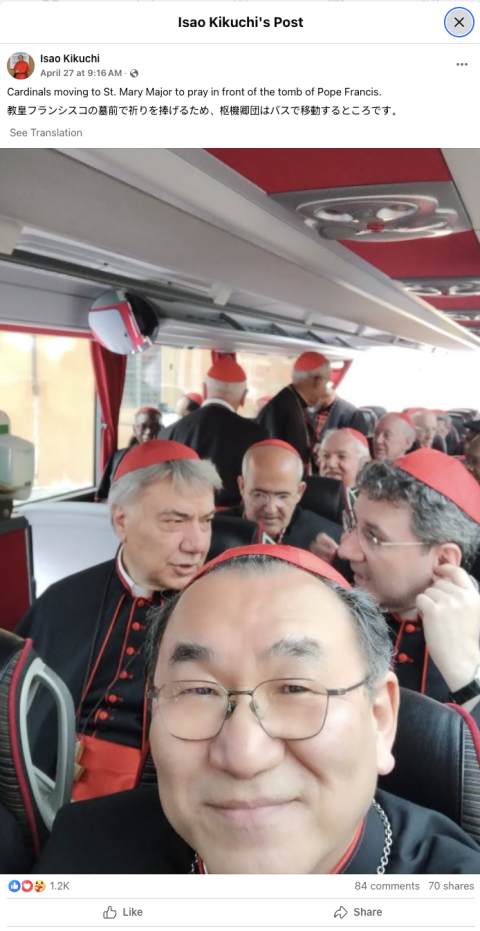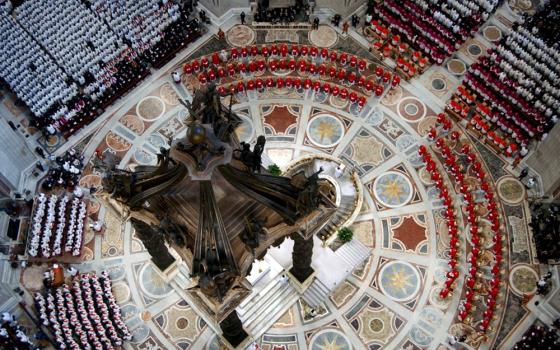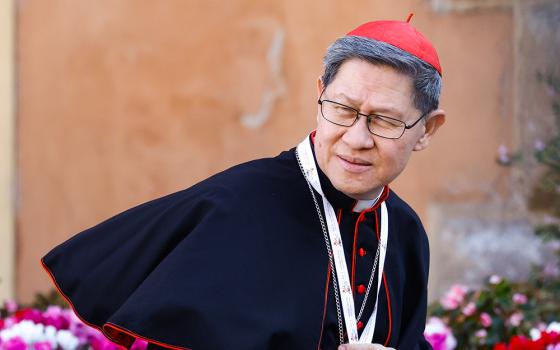Cardinals attend the funeral Mass of Pope Francis in St. Peter's Square at the Vatican April 26. The conclave to elect the new pope is set for May 7, 2025. (OSV News/Remo Casilli, Reuters)
As nearly 200 cardinals from around the world hold secret closed-door meetings ahead of next week's conclave, one simple need has emerged: name tags.
"After a request, we will also have name badges stating where we are from," England's Cardinal Vincent Nichols told The Times, the British daily.
Of the 135 cardinals under the age of 80, and thus eligible to participate in the conclave, 80% were created by Francis — meaning this is their first conclave.
Two of the eligible cardinal electors have informed the Holy See that they will not be able to participate in the conclave for health reasons, bringing the number of electors to 133, the Vatican announced at an April 29 briefing.
The names of the cardinals dropping out of the conclave were not announced. One is likely Spanish Cardinal Antonio Cañizares Llovera, 79, who had previously said that he would withdraw.
Many of the cardinals this week are using the general congregations, as the daily pre-conclave meetings are known, to get acquainted with one another before they enter the Sistine Chapel on May 7.
Japan's Cardinal Tarcisio Isao Kikuchi posted this selfie-photo on Facebook as cardinals April 27 traveled by bus to pay respects to Pope Francis' tomb. In the background of the photo is Naples Cardinal Domenico Battaglia speaking with Toronto's Cardinal Francis Leo. All three are first-time voters and were elevated as cardinals by Francis in his final consistory in December.

Japanese Cardinal Isao Kikuchi posted this selfie on Facebook. The photo was taken on his way to St. Mary Major. (Japanese Cardinal Isao Kikuchi via Facebook.)
The major story in the Italian press today (April 29) is the final verdict on Sardinian Cardinal Angelo Becciu, who previously served as Francis' sostituto, that is his chief of staff, and then later as the head of the Vatican's Dicastery for the Causes of Saints.
Becciu resigned under fire in 2020, thus losing his "rights connected to the cardinalate," which by all interpretations meant he was barred from participating in the conclave. Becciu, who has maintained his innocence, was later found guilty by a Vatican court for financial embezzlement in a closely watched Vatican financial trial in 2023.
Despite losing the rights of a cardinal, Becciu initially told reporters that he intended to enter the conclave. But finally, on Tuesday morning, he released a statement that he had "decided to obey, as I have always done, the will of Pope Francis not to enter the conclave."
Many of the Italian newspapers, which often lean toward the sensational, continue to push the candidacy of Francis' longtime secretary of state, Cardinal Pietro Parolin. The last three popes have not come from Italy. Prior to the election of Pope John Paul in 1978, it had been 455 years since there was a non-Italian pope.
Il Fatto Quotidiano estimates that Parolin, 70, could enter the first round of voting with at least 40 votes. In the United Kingdom, one of the country's largest bookmakers, William Hill, lists Parolin as its favorite going into the conclave. In 2013, William Hill's odds, which tend to rely heavily on the Italian papers, were on Milan's Cardinal Angelo Scola.
Meanwhile, Spain's Vida Nueva reports that conservative cardinals led the charge during Monday's pre-conclave meetings, with Nigerian Cardinal Francis Arinze and German Cardinal Gerhard Ludwig Müller being "particularly belligerent in substance and form."
Advertisement
Müller, the former head of the Vatican's doctrinal office whom Francis replaced in 2017, recently told the New York Times that the late pope's style was to divide the church, especially by introducing topics such as women's leadership and gay blessings.
"All dictators are dividing," Müller said.
Cardinal Pietro Parolin, former Vatican secretary of state, venerates an icon while celebrating Mass in St. Peter's Square at the Vatican on April 27, the second day of the nine days of mourning for Pope Francis. (CNS photo/Pablo Esparza)
Britain's Nichols, in his interview with The Times, rejected Müller's insinuation that the church might risk splitting if it elected a future pope in the mold of Francis.
"Certainly not," the English cardinal countered. "Cardinal Müller has a fine and wonderful scholar’s mind and he tends to see things in those somewhat abstract ways."
One hundred and eighty-three cardinals participated in Tuesday's general congregation, more than 120 of whom were cardinal electors. At the gathering, the cardinals listened to a spiritual meditation from Benedictine Fr. Donato Ogliari.
Ogliari, abbot of St. Paul Outside the Walls in Rome, used his reflections to offer a rallying cry for the cardinals not to forget Francis' vision of a church that "knows how to be even a voice outside the chorus while stubbornly pointing to the paths of justice, fraternity and peace."
According to the text released by the Vatican's press office, Oligari said, “The church rooted in Christ is a Church that is a teacher of fraternity, taught with words and gestures marked by mutual respect, dialogue, culture of encounter and building bridges and not walls, as Pope Francis has always invited us to do."
Cardinal Giovanni Battists Re, dean of the College of Cardinals, leads the fifth general congregation meeting of cardinals in the New Synod Hall at the Vatican April 28, 2025. (CNS/Vatican Media)
In his remarks, the abbot said that the church must live in a "diverse communion," and he told the cardinals that the late pope's focus on synodality "has produced flames of participation and renewal in every corner of the world."
The synodal process invites all the baptized to make contributions to the church, Oligari said.
"I believe that this is a clear sign of the times," he said. The synodal process can "revitalize communion and participation within the ecclesial body."
Dialogue within the church, which Francis intensified, should be pursued without fear, Oligari said.
“It is a constitutive element of the mission of the church," the abbot said.
Rhina Guidos and Camillo Barone contributed to this story, The National Catholic Reporter's Rome Bureau is made possible in part by the generosity of Joan and Bob McGrath.








